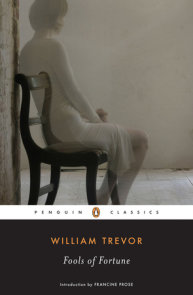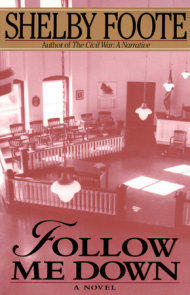READERS GUIDE
Questions and Topics for Discussion
1. Magda says of William Blake and his wife, Catherine: "She was
his mate, but she was not his match." In light of this quote, discuss
the meaning of the title The Good Husband. What other
meanings does the title suggest?
2. Laurence tells Hugo, "We can’t be free until we tell our story."
How is self-censorship a common problem of the characters in
The Good Husband? What holds them back from being perfectly
honest with one another, and with themselves? How do
they triumph over their self-censoring impulses, or do they?
3. By the end of the novel, Alice has taken Elberta under her wing.
How does Elberta become like a surrogate child to Alice? How
do she, Alice, and Francis begin to comprise a makeshift family?
What does Elberta admire about both of them?
4. Cal accuses his father of "making people into what you’ve decided
who they are, like characters in your novels." Do you
agree or disagree with this statement? Who in The Good
Husband is guilty of this trait? Does it prevent them from acknowledging
the realities of life, or serve as a coping technique?
5. How does Magda’s statement about mates and matches apply
to her marriage to Francis? Does it pertain also to the partnership
between Hugo and Alice? In your view, what are the
biggest challenges faced by each couple?
6. The Good Husband pivots on two very different marriages.
What, in your opinion, could each partnership learn from the
other? What lessons, if any, has Hugo learned from his first
marriage?
7. As she becomes more and more ill, Magda grows increasingly
fascinated by her impending demise. How does she become
more comfortable with the concept of death by equating it with
literature and her academic life? Does this allow her to understand
the coming "final examination," or does it instead remove
her farther from it? In your opinion, what does she most want
to understand about herself–and those around her–before she
dies?
8. When Alice begins to visit Magda, she slowly starts to work
her way out of depression. Why do you think that Magda has
that effect on her? In turn, what about Alice so appeals to the
dying woman? What similarities, if any, do the two women
share?
9. Francis chooses to live his life for others. How has this pattern
evolved throughout his life? What characteristics of his personality
compel him to service? How is he different from Magda in
that regard? What aspects of his personality cause Alice to fall
in love with him?
10. In which ways is Magda mean-spirited toward Francis? In your
opinion, does she take joking too far? Does she deliberately
taunt him? How does he respond to her verbal sparring?
11. Francis is the object of affection for several women in the novel.
What about him so intrigues the opposite sex? Why isn’t he
threatening to the men around him? Do you think that he will
marry again?
12. The death of Hugo and Alice’s child devastates both of them.
What are the different ways in which they deal with grief? Does
Alice’s experience with death make her more resilient than
Hugo or less so?
13. When she marries Hugo, Alice is a successful editor. What
about her personality compels her to give up a burgeoning career
without a second thought? Why does Hugo’s writing appeal
to both her mind and her heart? Do you think she will
remain Hugo’s "best reader"?
14. At the outset, what compelled Alice to choose home birth for
her son? How does that decision relate to the sudden loss of her
family? How does their sudden death haunt her throughout the
book? In particular, how is Alice consumed by her relationship
with her brother?
15. Magda and Hugo both explode with outbursts throughout the
novel. How do these fits of temper enable them to cope with
their difficulties? Do these outbursts also hinder their ability to
cope? What other similarities do Magda and Hugo share?
16. The theme of the muse as the source of inspiration resonates
throughout The Good Husband. How does creative inspiration
sometimes elude both Magda and Hugo? How is Hugo’s
imagination stirred by meeting Bea McCandless and traveling
to his boyhood home? What is Magda’s view about the "spirits"
that propel–or stymie–her own work?
17. Magda tells Francis, "You’re one of the tireless ones." How is
this an accurate assessment of her husband? Does this statement
also sum up Magda’s personality? If so, how?
18. In your opinion, what are Francis’s "beasties in the shadows"?
Why did Magda want to connect with his inner demons? If she
had, would the character of Francis have been more fully realized
and well-rounded? How would the marriage have been
different as a result?
19. Hugo constantly finishes Alice’s sentences and answers questions
meant for her. Why does she initially accept this behavior?
What compels her to finally become irritated by it?
20. Hugo has a tumultuous relationship with his son, Cal. Why do
the two find it difficult to relate to one another? How does
Cal’s homosexuality and relationship with Laurence force the
father-son relationship to evolve?
21. Spirituality is an underlying theme in The Good Husband. Although
Francis abandons the seminary upon meeting Magda,
does his religious faith continue to guide him? How does his
spirituality translate into the secular world? How does Magda’s
unique brand of spirituality intensify as she faces her "final examination"?
Do you think Francis will become more out-wardly
religious following Magda’s death?
22. The alumni cruise takes place on the ship Galatea. Knowing
that Galatea is the woman transformed by Pygmalion in the
Greek myth, why is the ship’s moniker important? How is the
cruise a pivotal event for those sailing on it, especially Francis,
Alice, and Hugo




















